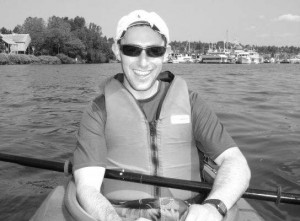What is your name? Ross Peizer
Alias? No alias but my girlfriend’s name is Rachel so when we introduce ourselves together, fans of the show Friends have fun with that one.
Where were you born and where do you call home? I grew up in Seattle but have lived all over the country since I first left to go to college. Even after living and becoming a part of communities in Boston, Sydney, Tucson, New Orleans and Montana I still call Seattle home. You know you’re from Seattle when your closet looks like an REI catalog!
What are your big summer plans? This summer I’m looking forward to going hiking and camping around Oregon and Washington including Crater Lake and possibly some of the National Parks in Washington as well. I am also looking forward to going up to Seattle for a good friends wedding and Portland for a concert at the Oregon Zoo.
Name of the last movie you saw and give it a rating: I watched Jobs a few weeks ago. The movie about Steve Jobs and Apple Computers. I’d give it 2 stars. I think my expectations were too high for this one. The story line was interesting to learn more about behind the scenes of Apple but the acting was pretty bad and it left me asking a lot of questions and wondering how much they embellished relationship issues to make a more interesting movie.
In which graduate program are you enrolled? I am going into my second year of the Community and Regional Planning program. My focus area is Sustainable Cities. I am particularly passionate about sustainable transportation and excited to be the incoming President of LiveMove – UO’s Transportation and Livability student group.
What CPW project did you worked on during the academic year? This past year in Community Planning Workshop I worked on the natural hazard plan integration project in Madras, Oregon. Our team worked to integrate the Jefferson County Natural Hazard Mitigation Plan (NHMP) and Madras specific addendum into the City of Madras Comprehensive Plan. This involved revising the natural hazards chapter of the Comprehensive Plan. The project was important because the current natural hazards chapter did not address all of the hazards Madras faces and the NHMP is not a regulatory document whereas the Comprehensive Plan is regulated by the Department of Land Conservation and Development (DLCD).
What is the most critical skill you learned from being engaged in CPW this past year? All the important details of a planning project from public outreach to memo and staff report writing to working on a team and with a client.
What about CPW made you smile? Definitely our road trips to Madras and back. We got pretty addicted and competitive about auto bingo as mentioned in a previous blog post.
What is your favorite quote? “Turns out not where but who you’re with that really matters.” I don’t listen to Dave Matthews Band as much as I used to but I still love this quote from one of their songs.
What is your ‘best-kept secret’ you’d recommend? I created a Seattle to do list for friends who visit when I’m not there so they can show themselves around. It’s hard to pick but I think my #1 recommendation on that list would be to rent kayaks from Agua Verde Paddle Club and then go to their café for lunch.
Where can we ‘cyber-stalk’ you? LinkedIn: http://lnkd.in/UQnbGg


